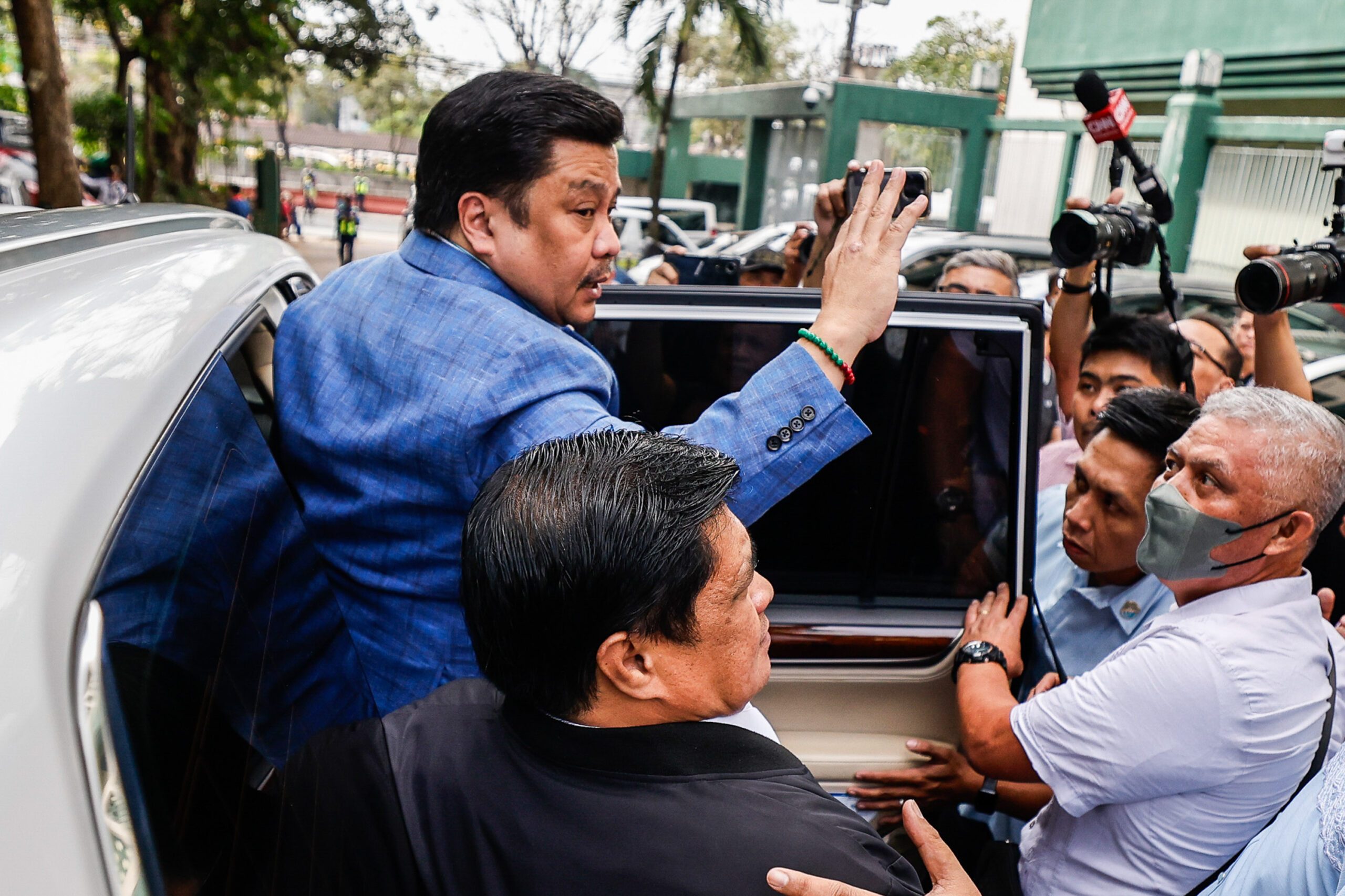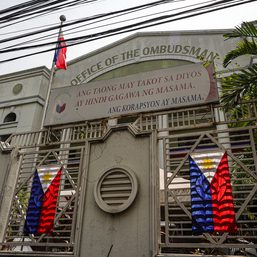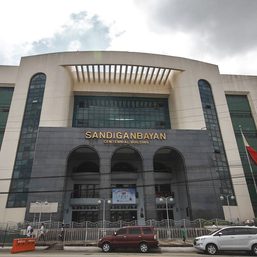SUMMARY
This is AI generated summarization, which may have errors. For context, always refer to the full article.

MANILA, Philippines – Not meeting the threshold amount of P50 million, the anti-graft court Sandiganbayan acquitted Senator Jinggoy Estrada of plunder, but convicted him of three counts of bribery – a lesser offense – because the prosecution failed to establish the graver crime.
“Granting that the evidence on record is not sufficient to establish beyond reasonable doubt the crime of plunder, the accused may still be convicted of a lesser offense by the prosecution under the variance doctrine,” reads the 396-page decision of the Sandiganbayan Fifth Division issued in open court on Friday, January 19.
“We don’t know why there is bribery because from the start, none of the witnesses testified that he received any money, so it cannot be bribery for us, because you did not receive any money,” said Estrada’s lawyer Alexis Abastillas-Suarez right after the verdict was read Friday.
Estrada was ordered to pay a P3-million fine, and was sentenced to eight to nine years for one count of direct bribery, and two to three years for two counts of indirect bribery. This is appealable, and he will remain free. The convictions carried accessory penalties of perpetual cancellation of the right to vote, and suspension from public office. Estrada’s lawyers claimed this penalty is not immediately executory and also subject to appeal.
The variant explained
The prosecution accused Estrada of pocketing P180.9 million in kickbacks when he allegedly participated in the pork barrel scam.
The fraudulent scheme worked this way: Janet Lim Napoles created bogus NGOs and conspired with implementing government agencies (many of which had been closed down because of the scandal) to partner with them. The lawmakers then allocated their discretionary Priority Development Assistance Fund (PDAF) or pork barrel, now abolished, to their endorsed NGOs for projects that did not exist. In the scheme, Napoles who got the funds, gave commissions to her co-conspirators.
The P180.9 million allegation was largely based on the records of whistleblower Benhur Luy, a close associate of Napoles who kept records of transactions. It surpasses the P50-million legal threshold for plunder, a crime that demands proof of ill-gotten wealth being amassed from public money.
The court used a combination of hard evidence and logic to verify if the alleged kickbacks should be counted in the case. If an amount appeared on Luy’s record, it should have matched a deposit of government funds to the bank account of the receiving NGO. Subsequently, there should have been a withdrawal made by the NGO, ostensibly to pay kickbacks.
The amount withdrawn should have been deposited to the account of the accused (Estrada) within 30 days. This follows the logic that 30 days is about the time it takes for a complicit NGO to deliver kickbacks.
Deposits made beyond 30 days were seen as unrelated. Finally, the amount deposited to the NGO should have matched an endorsement letter from Estrada and an issued SARO or Special Allotment Release Order.
It is the Department of Budget and Management that issues a SARO, which facilitates the release of specific funds to agencies for very specific purposes.
After verification, only P9.875 million was counted. “The element of plunder covering the threshold amount of P50 million was not established in this case,” said the decision, concurred in unanimously by Associate Justices Rafael Lagos, Maria Theresa Mendoza-Arcega, and Maryann Corpus-Mañalac.
Estrada denied ever conspiring with Napoles, saying he met her only on social occasions. He said he chose projects from a menu provided to senators, with the assumption they were all valid. His signatures, however, appeared on the endorsement letters for the Napoles NGOs.
“Senator Estrada, on record, denied signing letters endorsing SDPFFI [Social Development Program for Farmers Foundation Inc.] and MAMFI [Masaganang Ani Para sa Magsasaka Foundation Inc.], but he was not able to present expert testimony on any forgery,” the decision said.
The court said that the signatures “will not suffice to ascertain his liability as a co-conspirator” because the act of signing an endorsement letter was not an inherently immoral act.
“As the court sees it, the conspiracy between Napoles and Senator Estrada has not been established beyond reasonable doubt. Rather, the veritable co-conspirators in this case are Napoles and Pauline Labayen,” said the court. Labayen was Estrada’s Senate appointments secretary.
“As the evidence proves, the public officer who primarily benefitted from the PDAF of Senator Estrada is no other than Labayen,” said the court. Labayen remains at large. Her case has been archived, and an arrest warrant has been reissued.
With the threshold amount not met, and the court finding the endorsements insufficient to convict, plunder was taken off the table.
Direct bribery
However, in the P9.875 million worth of deposits that matched NGO withdrawals and SAROs, P1 million was found to have been deposited to Estrada’s bank account.
In this case, Estrada signed his endorsement letter for MAMFI on April 9, 2008 for a P19.5 million fund. On September 15, 2008, P17 million was deposited to MAMFI’s bank account, and on the same day, P5 million was withdrawn from the same bank account.
It matched Benhur Luy’s record that he gave Labayen P5 million in cash on September 18, 2008. And on the same day, P1 million was deposited to Estrada’s bank account.
Article 210 of the revised penal code defines direct bribery as involving a public officer “who shall perform an act constituting a crime, in connection with the performance of his official duties, in consideration of any offer, promise, gift or present received by such officer.”
The court said all elements of the crime were present: Estrada is a public officer, he received bribe money, and he endorsed a bogus NGO for his PDAF project.
“Being a senator who is allocated with PDAF, he exercised full control over the release thereof and had the sole discretion as to the livelihood project that would be funded by it….His endorsements of Napoles’ NGOs to implement projects funded by his PDAF could not have materialized if not for the public office he held,” said the court.
The remaining P8.875 million was found to have been deposited to Labayen, who has yet to offer any defense, and remains a fugitive. In the case of Senator Bong Revilla, his former senior staff Richard Cambe faced trial and was convicted of plunder, whereas Revilla was acquitted.
Cambe died inside the New Bilibid Prison in April 2021 from a stroke.
Indirect bribery
The court gave weight to the testimony of witness Ruby Tuason, a socialite close to the Estradas, who said that she gave Estrada P1.5 million on one occasion in 2004, and P4.2 million on another occasion in 2005, as part of the senator’s kickbacks. The money was from Napoles, said Tuason. Both were given in cash in a bag, said Tuason.
The amounts match Luy’s records, but were excluded from computation because the prosecution could not present corresponding endorsement letters.
“Just a few days after, he called me to tell me he was cancelling the transaction,” said Tuason during a court hearing, “I asked him why, and he said, ‘Huwag na lang, huwag na lang, cancel.’” (Don’t, just don’t, cancel.)
Tuason said she gave the total P5.7 million back to Napoles.
“Notwithstanding the return of the said amount to Napoles via Tuason after a few days, the crime of indirect bribery was already consummated,” said the court.
Estrada denied that Tuason ever delivered pork barrel kickbacks to him. The senator only admitted a P1 million delivery made at Zirkoh, Greenhills on September 17, 2008, “but it had no relation with PDAF” and that it was a payment of debt “because she borrowed P1.5 million several years back for the renovation of her house.”
Suarez questioned the variance method, pointing out that bribery is under the revised penal code, and plunder is a special law, adding they are yet to study what their appeal will be. But the plunder acquittal “is definitely a big victory for us,” she said. – Rappler.com
Add a comment
How does this make you feel?
![[WATCH] Bamban POGO scandal: There’s a bigger fish than Alice Guo](https://www.rappler.com/tachyon/2024/07/inside-track-tcard-bamban-pogo.jpg?resize=257%2C257&crop=435px%2C0px%2C1080px%2C1080px)



![[OPINION] What kind of citizens are we?](https://www.rappler.com/tachyon/2024/07/tl-what-kind-of-citizen-are-we.jpg?resize=257%2C257&crop=333px%2C0px%2C1080px%2C1080px)


![[EDITORIAL] Justice, Philippine style: Acquitted sa plunder, pero may kabig naman](https://www.rappler.com/tachyon/2024/01/animated-jinggoy-estrada-acquittal-carousel.jpg?resize=257%2C257&crop_strategy=attention)







There are no comments yet. Add your comment to start the conversation.